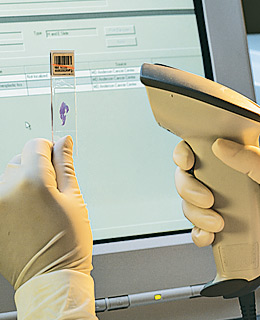
The ability to genotype, or get the DNA fingerprint of a tumor, is transforming the way doctors treat breast cancer. By comparing the genetic profiles of different tumors to those of normal breast tissue, researchers can pick out which genes trigger the disease and even which ones make a tumor more vulnerable to chemotherapy. Doctors are currently using the three tests below to match their patients to the most effective treatments, but in coming years this powerful technology may even help them identify particularly aggressive tumors. "We are obtaining more and more information about tumors," says Dr. Lajos Pusztai of M.D. Anderson Cancer Center, "and more information is always better to help us make the right treatment decisions."
ONCOTYPE DX
This genetic screen analyzes 21 genes critical to breast-cell growth and uses live rather than frozen tissue. The result consists of a recurrence score, from zero to 100, that indicates a woman's risk of seeing her cancer return within 10 years of her diagnosis. High scores have been correlated with better responses to chemotherapy, and since its approval in 2004, the test has changed treatment decisions in about 30% of cases.
Who Benefits: Women with estrogen-receptor-positive cancers at the earliest stage of the disease
AMPLICHIP
Unlike the other gene screens, this test extracts DNA from a blood sample to detect an enzyme that controls the way a cancer drug, tamoxifen, is broken down. Certain genetic mutations can virtually shut down a cell's ability to metabolize tamoxifen, dramatically reducing the estrogen-based drug's success in containing tumor-cell growth. Screening women for this enzyme is sparing low responders the expense and time that would be lost trying an ineffective treatment.
A Screen Just For Me: Such testing is a first step toward personalized medicine
MAMMAPRINT
Similar to Oncotype DX, this test scans 70 genes expressed in breast tissue. A high score means a woman has a 25% chance of seeing her cancer spread to other tissues in five years, while a low risk score indicates a 90% chance that her cancer will not spread. One disadvantage of the screen: it requires frozen-tissue samples, which most U.S. hospitals do not routinely collect following cancer surgeries.
Availability Approved by the U.S.: FDA earlier this year, after being on the market in Europe since 2005.